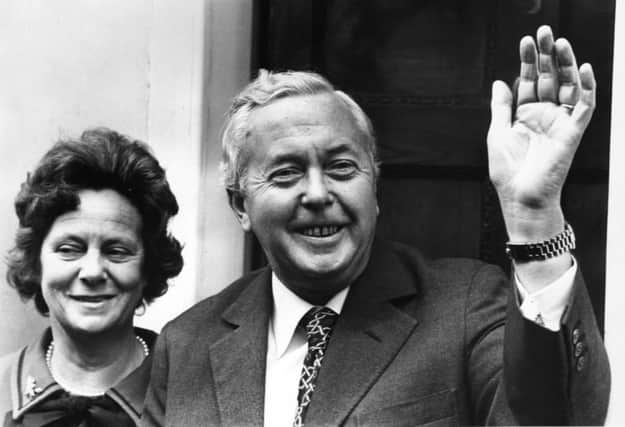On this day: Harold Wilson became prime minister


1802: The Edinburgh Review was published. Its first editor was Sydney Smith and its aim was “to erect a higher standard of merit, and secure a bolder and a purer taste in literature, and to apply philosophical principles and the maxims of truth and humanity to politics”.
1839: The first Bradshaw’s Railway Timetable was issued. It continued publication until 10 March, 1961.
1842: Britain proclaimed victory as first Afghan War ended.
Advertisement
Hide AdAdvertisement
Hide Ad1881: The Savoy Theatre, London, first public building to be lit by electricity, opened with a performance of Gilbert and Sullivan’s Patience.
1903: Mrs Emmeline Pankhurst formed the Women’s Social and Political Union to fight for female emancipation in Britain.
1913: Atlantic and Pacific Oceans were linked by the blowing up of the Gamboa Dam of Panama Canal.
1938: Nazi Germany completed occupation of Czechoslovakia’s Sudetenland.
1943: Generalissimo Chiang Kai-Shek took oath of office as president of China.
1951: First party political broadcast put out, by Lord Samuel on behalf of the Liberal Party.
1961: A volcano erupted on the South Atlantic island of Tristan da Cunha and the whole population was brought to Britain.
1970: Fiji became an independent member of the Commonwealth, having been a British colony since 1874.
Advertisement
Hide AdAdvertisement
Hide Ad1974: Labour won the general election by an overall majority of three seats, and Harold Wilson became prime minister.
1981: An IRA bomb outside the Guards’ barracks, Chelsea, killed one and injured 40, including 25 Irish guardsmen.
1988: Sandy Lyle won the World Matchplay Golf Championship at Wentworth.
1988: Suspected Tamil militants attacked village in northern Sri Lanka, killing at least 47 people as they slept.
1990: Left-wing guerrillas bolted door of a passenger train carriage in southern India and set it on fire, killing at least 47.
1997: An Austral Airlines DC-9-32 crashed and exploded near Nuevo Berlin, Uruguay, killing 74.
2006: The Greek city of Volos flooded in one of the prefecture’s worst recorded floods.
2010: The Netherlands Antilles were dissolved.
2013: Alice Munro was awarded the 2013 Nobel Prize for literature.
BIRTHDAYS
Advertisement
Hide AdAdvertisement
Hide AdBirths: 1813 Giuseppe Verdi, composer; 1731 Henry Cavendish, chemist and physicist who discovered hydrogen; 1780 John Abercrombie, Aberdeen-born, first consulting physician in Scotland; 1830 Isabella II, queen of Spain; 1877 William Morris, 1st Viscount Nuffield, car manufacturer and philanthropist; 1880 Sir Jacob Epstein, sculptor; 1900 Helen Hayes, actress; 1901 Alberto Giacometti, painter and sculptor; 1906 R K Narayan, author; 1913 Claude Simon, Nobel Prize-winning novelist, Nobel Laureate; 1917 Thelonious Monk, pianist; ; 1921 James Clavell, novelist, screenwriter and prisoner of war; 1930 Harold Pinter, playwright, screenwriter and director; 1933 Daniel Massey, actor; 1943 Dessie Hughes, racehorse trainer; 1959 Kirsty MacColl, singer and songwriter; 1965 Chris Penn, actor.
ANNIVERSARIES
Deaths: 1708 David Gregory, Aberdeen-born mathematician and astronomer; 1723 William Cowper, 1st Earl Cowper, first Lord Chancellor of Great Britain; 1747 John Potter, Archbichop of Canterbury; 1875 Aleksey Tolstoy, poet, novelist, playwright; 1964 Eddie Cantor, film actor and entertainer; 1983 Sir Ralph Richardson, actor; 1985 Yul Brynner, film actor; 1985 Orson Welles, actor, director, writer, producer; 1996 Hugh Stirling Mackenzie, Inverness-born vice-admiral; 2000 Sirimavo Bandaranaike, primie minister of Ceylon and Sri Lanka; 2004 Christopher Reeve, actor; 2005 Milton Obote, president of Uganda 1966 to 1971; 2009 Stephen Gately, pop singer (Boyzone); 2010 Dame Joan Sutherland DBE, soprano; 2010 Solomon Burke, R&B and soul singer; 2013 Scott Carpenter, astronaut.